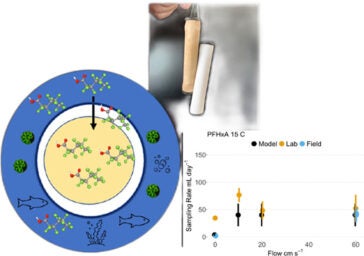 The increasing scale of PFAS in the environment and resultant risks to human health have catalyzed need for reliable and low-cost PFAS detection methods; passive sampling is an alternative to traditional water grab sampling, requiring no power source for in situ deployment. STEEP researchers evaluated a microporous polyethylene tube with a hydrophilic–lipophilic balance sorbent as a flow-resistant passive sampler for PFAS. In addition to efficiency and cost-effectiveness, integrative passive samplers allow for time-weighted averages of PFAS water concentrations, providing a holistic view of contamination over days, tides, and seasons. Research demonstrates tube sampling rates are sensitive to many PFAS compounds and thus may be utilized as a simple tool to screen various water bodies such as wells or rivers.
The increasing scale of PFAS in the environment and resultant risks to human health have catalyzed need for reliable and low-cost PFAS detection methods; passive sampling is an alternative to traditional water grab sampling, requiring no power source for in situ deployment. STEEP researchers evaluated a microporous polyethylene tube with a hydrophilic–lipophilic balance sorbent as a flow-resistant passive sampler for PFAS. In addition to efficiency and cost-effectiveness, integrative passive samplers allow for time-weighted averages of PFAS water concentrations, providing a holistic view of contamination over days, tides, and seasons. Research demonstrates tube sampling rates are sensitive to many PFAS compounds and thus may be utilized as a simple tool to screen various water bodies such as wells or rivers.
- Dunn, M., Becanova, J., Snook, J., Ruyle, B., and R. Lohmann. Calibration of Perfluorinated Alkyl Acid Uptake Rates by a Tube Passive Sampler in Water. ACS ES&T Water2023 3 (2), 332-341. [https://pubs.acs.org/doi/full/10.1021/acsestwater.2c00384]

